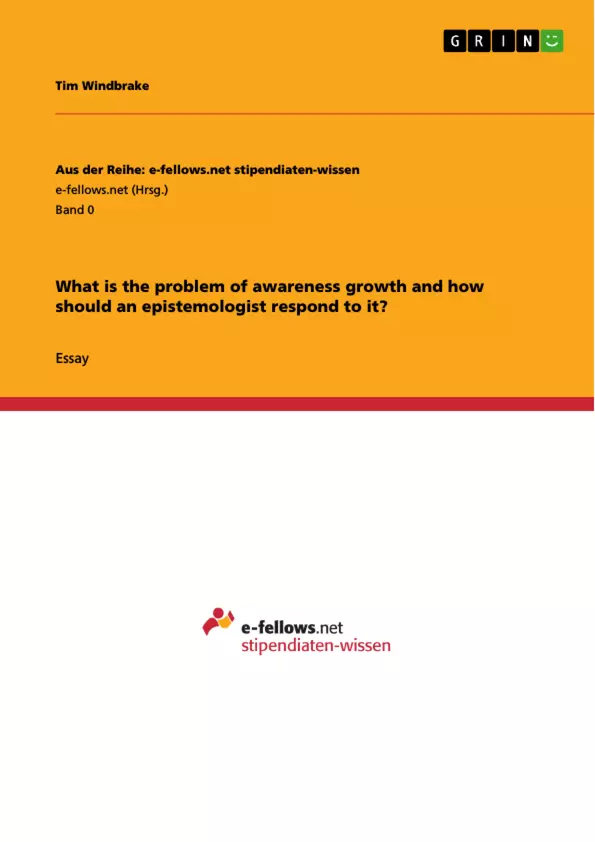This essay argues that there cannot exist a formal framework that consistently obtains intuitively correct results for all cases of awareness growth. This is because intuitions determine the rationally correct outcome of any case of awareness growth. Since it is reasonable for intuitions to vary between rational agents, it is feasible to obtain different intuitively correct results with two rational agents in an identical case of awareness growth. This impedes the existence of a framework that consistently obtains intuitively correct results for all cases of awareness growth.
First, I present the classical Bayesian framework and explain how the problem of awareness growth arises. Second, I present Bradley’s account of Reverse Bayesianism as a credence-revision rule and show that it fails to provide intuitively correct results for mixed cases of awareness growth, which disqualifies it as a general framework for all cases of awareness growth. Third, I demonstrate that intuitions determine the rationally correct outcome of any case of awareness growth and show that it is feasible to rationally obtain different intuitively correct outcomes when considering the exact same case of awareness growth with two rational agents.
Last, I conclude that it is impossible for a framework that consistently obtains the intuitively correct outcome to exist and suggest that credence-revision following awareness growth should occur on a case-by-case basis without any constraints other than the rationality assumption of the rational agent.
Inhaltsverzeichnis (Table of Contents)
- The classical Bayesian model and how the problem of awareness growth arises
- Reverse Bayesianism as a response to awareness growth and its shortcomings
- Landlord/Tenant-example
Zielsetzung und Themenschwerpunkte (Objectives and Key Themes)
This essay aims to argue against the existence of a formal framework that consistently obtains intuitively correct results for all cases of awareness growth. It will explore why this is impossible and suggest an alternative approach to credence-revision following awareness growth.
- The limitations of the classical Bayesian framework in handling awareness growth
- The shortcomings of Reverse Bayesianism as a general framework for all cases of awareness growth
- The role of intuitions in determining rationally correct outcomes in cases of awareness growth
- The feasibility of obtaining different intuitively correct outcomes for the same case of awareness growth with different rational agents
- The need for a case-by-case approach to credence-revision following awareness growth
Zusammenfassung der Kapitel (Chapter Summaries)
The essay begins by introducing the classical Bayesian model and explaining how awareness growth poses a challenge to it. This challenge arises because awareness growth involves the emergence of new propositions without new evidence, making it impossible to apply standard Bayesian conditionalization.
The essay then examines Reverse Bayesianism as a potential solution to the problem of awareness growth. It presents the different types of awareness growth identified by Bradley and describes how Reverse Bayesianism aims to update credences in these scenarios. However, the essay uses a mixed case of awareness growth to demonstrate that Reverse Bayesianism can lead to intuitively wrong results. This example highlights the limitations of Reverse Bayesianism as a universal framework for handling awareness growth.
Schlüsselwörter (Keywords)
The main keywords and focus topics of this essay are awareness growth, classical Bayesian model, Reverse Bayesianism, credence-revision, intuitions, rationality, and epistemology. The essay explores the limitations of formal frameworks in addressing the problem of awareness growth and emphasizes the importance of intuitions and case-by-case analysis in dealing with this epistemological challenge.
Frequently Asked Questions
What is the "problem of awareness growth" in epistemology?
It refers to situations where an agent becomes aware of new possibilities or propositions that were previously not in their conceptual framework, challenging standard Bayesian models.
Why does classical Bayesianism fail to handle awareness growth?
Classical Bayesianism assumes a fixed set of propositions; when new ones emerge without new evidence, standard conditionalization rules cannot be applied.
What is Reverse Bayesianism?
Reverse Bayesianism is a credence-revision rule proposed by Bradley that attempts to update probabilities when awareness grows, though the essay argues it has significant flaws.
How do intuitions affect the outcome of awareness growth?
The author argues that rational outcomes are determined by individual intuitions, meaning two rational agents can arrive at different but equally valid results.
Is there a universal framework for awareness growth?
No, the essay concludes that a consistent formal framework is impossible and that credence-revision should be handled on a case-by-case basis.
- Quote paper
- Tim Windbrake (Author), 2022, What is the problem of awareness growth and how should an epistemologist respond to it?, Munich, GRIN Verlag, https://www.grin.com/document/1263418



